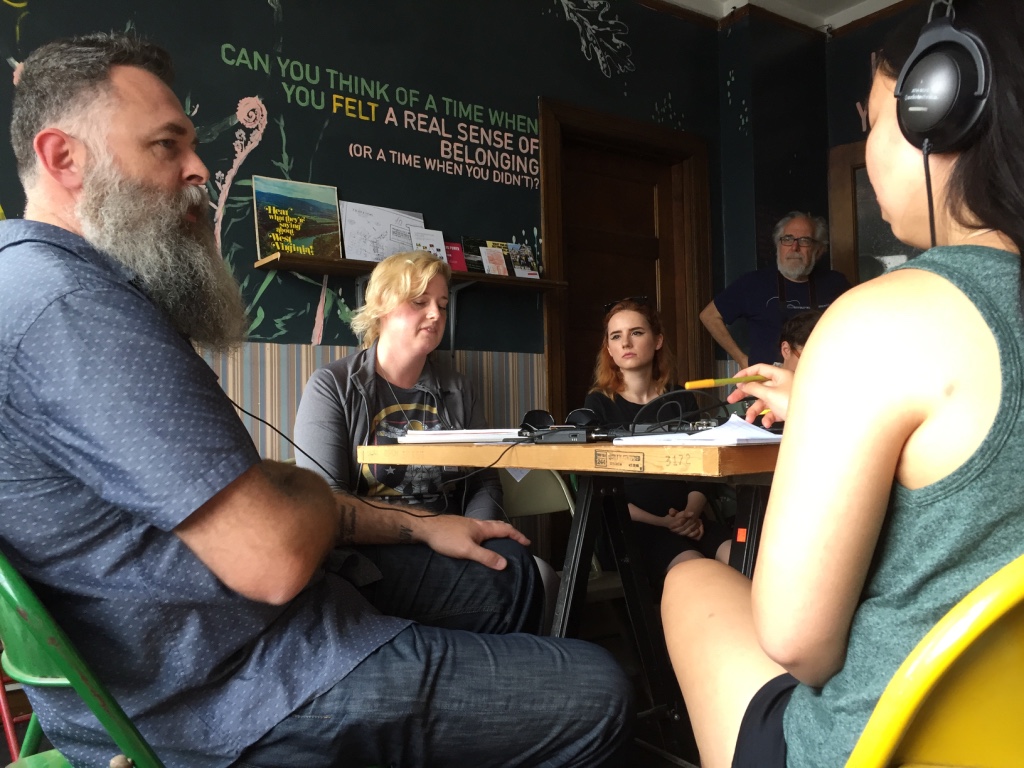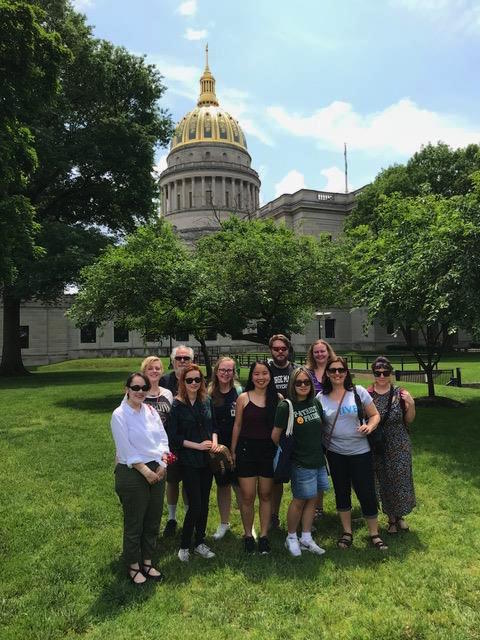
Documentary photographer Roger May (left) being interviewed by field school student Shelly Cornwell, with MacKenzie Edwards and Chris McGlone looking on. Amber Dube acts as recordist. Photo by Monica Gomez Isaac.
History is often told through the narratives of prominent men and women, while the stories of everyday people go unrecorded. That is why students from George Mason University’s Folklore Studies Program are doing their part in collecting histories otherwise forgotten.
For 10 days this past summer, students traveled to southwestern West Virginia, the heart of coal country, and completed fieldwork in Mingo, Logan and Kanawha counties. Emily Hillard, West Virginia’s state folklorist, connected students with people in the area. The students went to several small towns, made observations and conducted interviews.
“There are so many different ways that people lived that we might think we know about but don't really understand,” said creative writing student Chris McGlone. “This is particularly true of the Appalachians, which have been ‘understood’ through stereotypes and where the true history has been ignored.”
The project was led by Debra Lattanzi Shutika, director of the Field School for Cultural Documentation at Mason, which is a collaborative project with the American Folklife Center at the Library of Congress.
“A lot of [the students] knew conceptually what they were supposed to be doing, but they've never been asked to actually do it,” said Lattanzi Shutika, who is also the chair of Mason’s English Department. “I think it was a really good experience for them to actually apply the work.”
Folklorists study what they can collect, such as legends, myths, stories and oral histories. While history studies great men and women, said Lattanzi Shutika, folklore studies everyday people who tend to get overlooked by academia. In a world where people no longer keep diaries or extensive written records, the collection of stories is important, she said.

Field School (left to right) Monica Gomez Isaac, Shelly Cornwell, MacKenzie Edwards, Chris McGlone, Alex Bridges, Amber Dube, Luke Mitchem, Kara Stalker, Tara Sottolano, Debra Latanzi Shutika and Sarah Birns
The collection created by the students will soon be sent to the West Virginia Regional History Collection in Morgantown, West Virginia, where it will be available and accessible to the general public.
Alex Bridges, a senior majoring in anthropology, said recording these ordinary histories that may otherwise be lost was important to her.
“Since I've done so much work with archaeology, I know how much information gets lost, and I know how frustrating it is in the future,” said Bridges. “Yes, the big things get saved, but the majority of what happens in a society—the day-to-day mundanities, the voices of individuals—is barely recorded, or lost entirely.”
Bridges said that there is already a false narrative about West Virginia not being very diverse, which makes it particularly important to collect these personal narratives.
“Studying the perspectives and hearing firsthand the opinions from West Virginians provided a more objective portrayal of how community members identify themselves, versus what is inaccurately conveyed by national news outlets and politicians,” said anthropology student Monica Gomez Isaac.
Next summer, folklore professor Lisa Gilman will lead a local summer field school. In 2020, Shutika hopes to return to West Virginia with another group of students to make deeper connections there.
